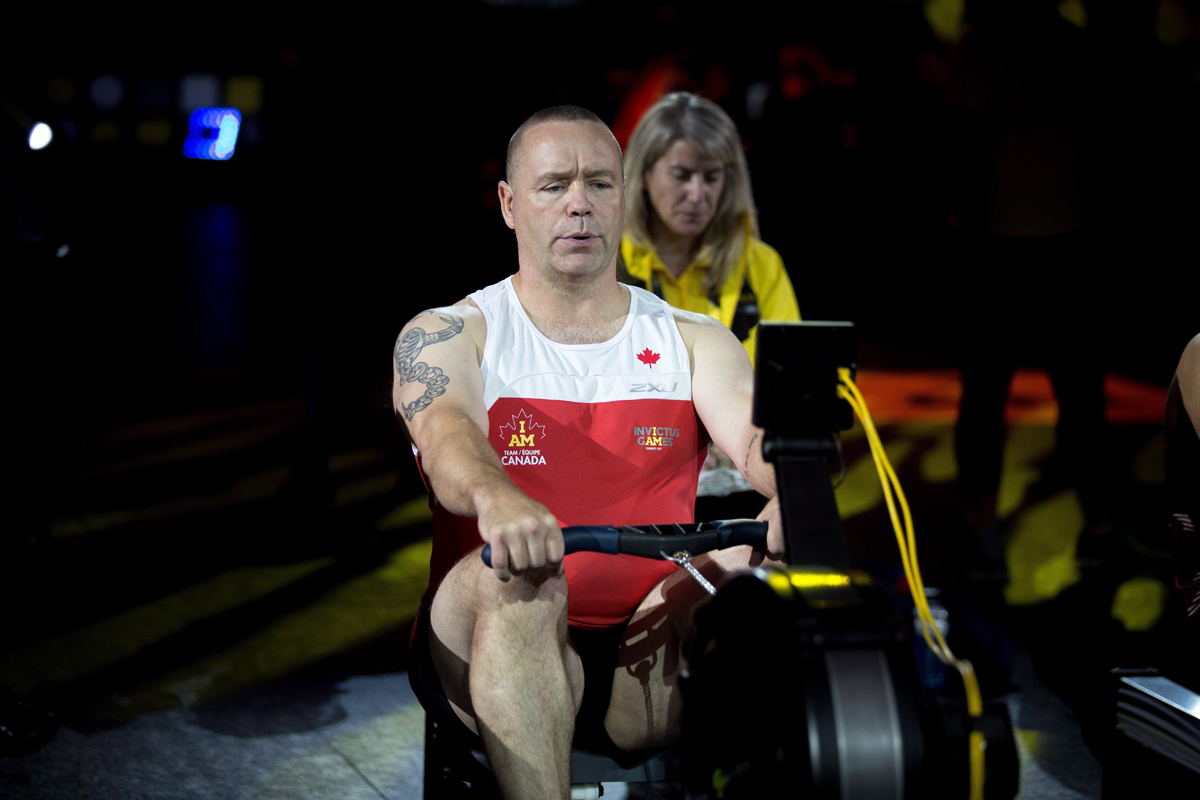When Sergeant Lorne Ford competes at the Invictus Games, the friends he lost in Afghanistan will be on his mind.

“When I do think of them it gets very emotional but it gives me that extra boost to finish the last 30 seconds, as hard as I can,” Ford told Global News this week.
Ford was injured in Afghanistan in 2002 when an American fighter pilot mistakenly dropped a bomb on a section of the 3rd Battalion, Princess Patricia’s Canadian Light Infantry.
WATCH: Prince Harry addresses athletes at Invictus Games in Toronto

Four Canadian soldiers were killed and eight more were injured, including Ford, in what became known as the Tarnak Farm incident. All four men who died — Sgt. Marc Leger, Cpl. Ainsworth Dyer, Pvt. Nathan Smith and Pvt. Richard Green — were in their 20s.
The explosion injured Ford’s right eye so badly that it had to be removed. Flesh from above his left knee was torn away and a nerve in the same leg was severed, leaving him with no feeling in his left foot. He now walks with a limp.
READ MORE: How training for Invictus Games helped a Canadian veteran overcome PTSD
Ford downplays his injuries and says the hardest part of recovering was regaining his competitive edge that helped him find success in the military. He also misses not being able to train fully with his fellow soldiers.
“Definitely had some dark days when I saw the troops going out to do some hard training and I felt I needed to be there and I wasn’t going to be,” he said. “I started to think that I was letting my friends down. I know it’s a silly to thing to say but that’s what ripped at my heart.”
WATCH: Invictus Games continue in Toronto
Ford said the Canadian Forces program Soldier On which helps rehabilitate injured veterans, introduced him to rowing and rugby, which helped him start the road to recovery. He said he loves the sport of rowing because of the short, intense physical toll it takes on your body.
“The more difficult something is the more I want to do it,” said the 47-year-old, adding he hopes to set a personal record in the one-minute sprint and four-minute endurance rowing events.
Ford was selected as one of 90 athletes representing Team Canada at the Invictus Games currently underway in Toronto.
“The biggest way it’s helped me is to get that feeling that I haven’t had in 15 years since I’ve been hurt,” Ford said. “It’s such a foreign feeling but now it’s brought to the forefront we are representing Canada, we are training as hard as we can to do the best that we can.”
READ MORE: Invictus Games helps a former medic live her life instead of just surviving it
This is the third year for the Invictus Games an international sports competition for military veterans with physical or mental injuries. Prince Harry, a former captain in the British army, founded the games in 2014 as a way to showcase the “unconquered spirit” of wounded soldiers from several nations, using the Latin word Invictus’ meaning ‘Unconquered.’
More than 550 athletes from 17 countries are competing in 12 sports in Toronto this year, making it the largest in the history of the sporting event.
Ford currently works as a unit embarkation officer with the Canadian Army in Edmonton, Alberta. He credits his continued service for being able to recover mentally from his injury.
“My focus was on what I can do, not what I couldn’t do. I am still serving. I’m a jump master. I throw guys out of planes,” he said. “Instructing and teaching young soldiers to do what I am absolutely passionate about helped keep me sane.”
Training and competing at the Games in front of his family and friends have given him a feeling of “pure excitement.”
“This is our Olympics,” he said. “We have a common bond that no one else can understand. Regardless if you have a physical or non-physical injury there is a common bond that everybody has gone through something traumatic. That does not change from any athlete that is here. We went through something that is pretty horrible. And we are trying to deal with it in our own way.”











Comments